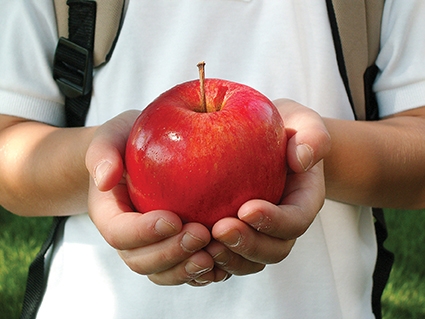Education Ministry Offers Free Apples to Tbilisi Schoolchildren from September
Education Minister of Georgia, Alexander Jejelava has initiated a new campaign to distribute free apples at Tbilisi schools that have more than 1,000 pupils.
The minister explains that the aim of the campaign is to promote a healthy lifestyle among children. Jejelava says the program will be expanded in future so that all pupils throughout Georgia will get an apple a week from the State.
“The program will last from September to December 2017. The project is quite complicated and expensive but we want pupils to eat apples during the breaks,” the minister stated at a special press-conference.
Jejelava thinks that, at the first stage, around 40,000-60,000 schoolchildren will get apples from the State weekly.
The minister also said that board games are to be introduced in schools from September as a pilot project which will be gradually launched in every school in Georgia.
“We started working with the games’ producers with the desire to use board games in primary classes. There is great experience in this direction in the world,” he said.
Moreover, the Ministry of Education intends to simplify the program for 7, 8 and 9th grades.
“Grades 7, 8, and 9 should be relatively light and fun. We should focus on the development of social skills, sports and a healthy lifestyle. We are working in this direction,” Jejelava stated.
“Labor” lessons will also be introduced in schools from September. Labor classes were very popular in Soviet and post-Soviet times in schools, but were abolished in the late 90s. Minister Jejelava says the subject will be re-introduced as a way to develop students’ labor skills.
“This will be an important step for promoting vocational education and I think it will be fun for children. Most importantly, it should be diverse, with children being offered many alternatives,” he added.
Jejelava explained that at first this will be a pilot project to be individually tailored to each school depending on the available facilities, such as space for workshops or vegetable gardens.
“First, we have to assess the facilities and capacities each school has in order to develop their potential. At this stage, we don’t plan to set up vegetable gardens at schools,” he added.
This spring, the Education Ministry introduced a pilot program of free lessons at some schools, which envisages more sports classes and the promotion of cultural-cognitive skills in children.
From the new academic year, the project will be introduced in most schools of Georgia.
Thea Morrison












